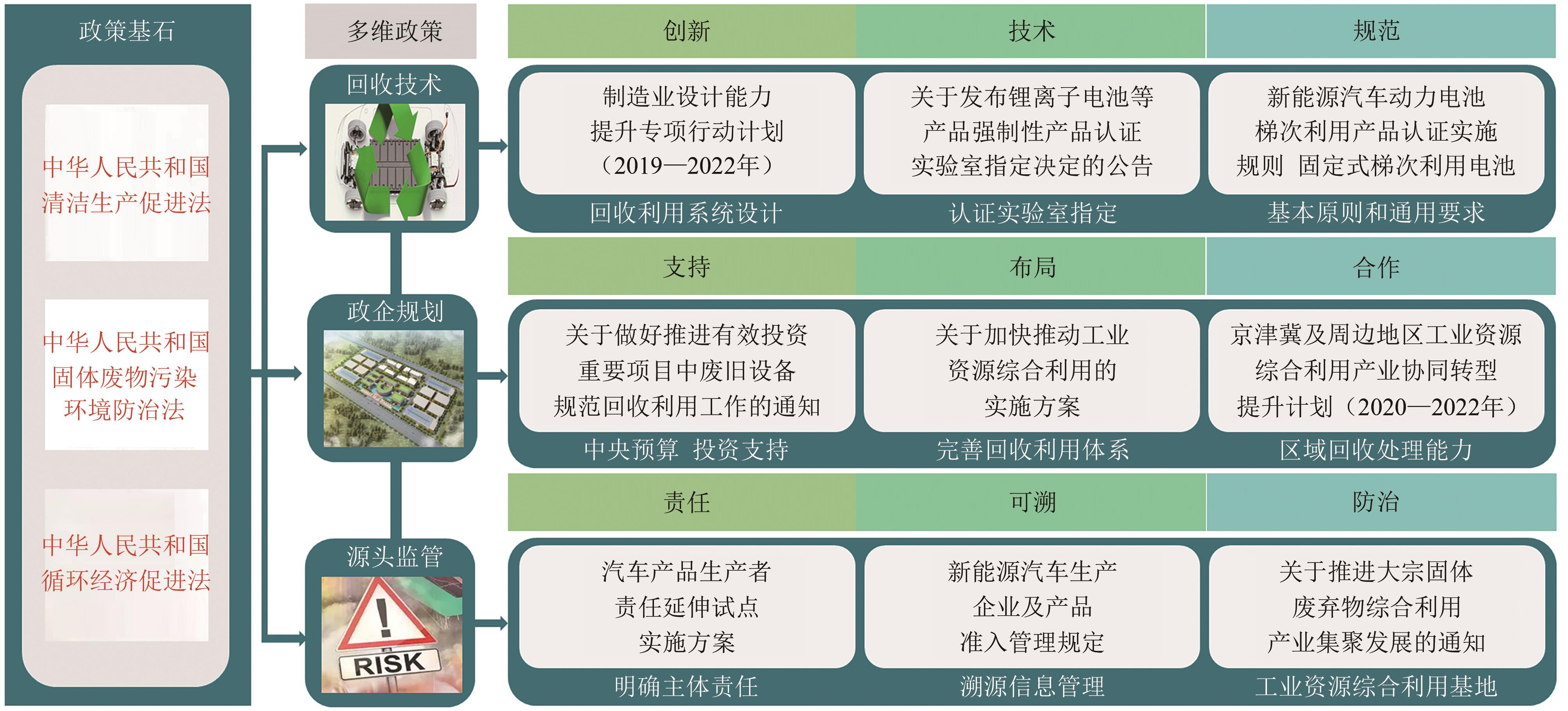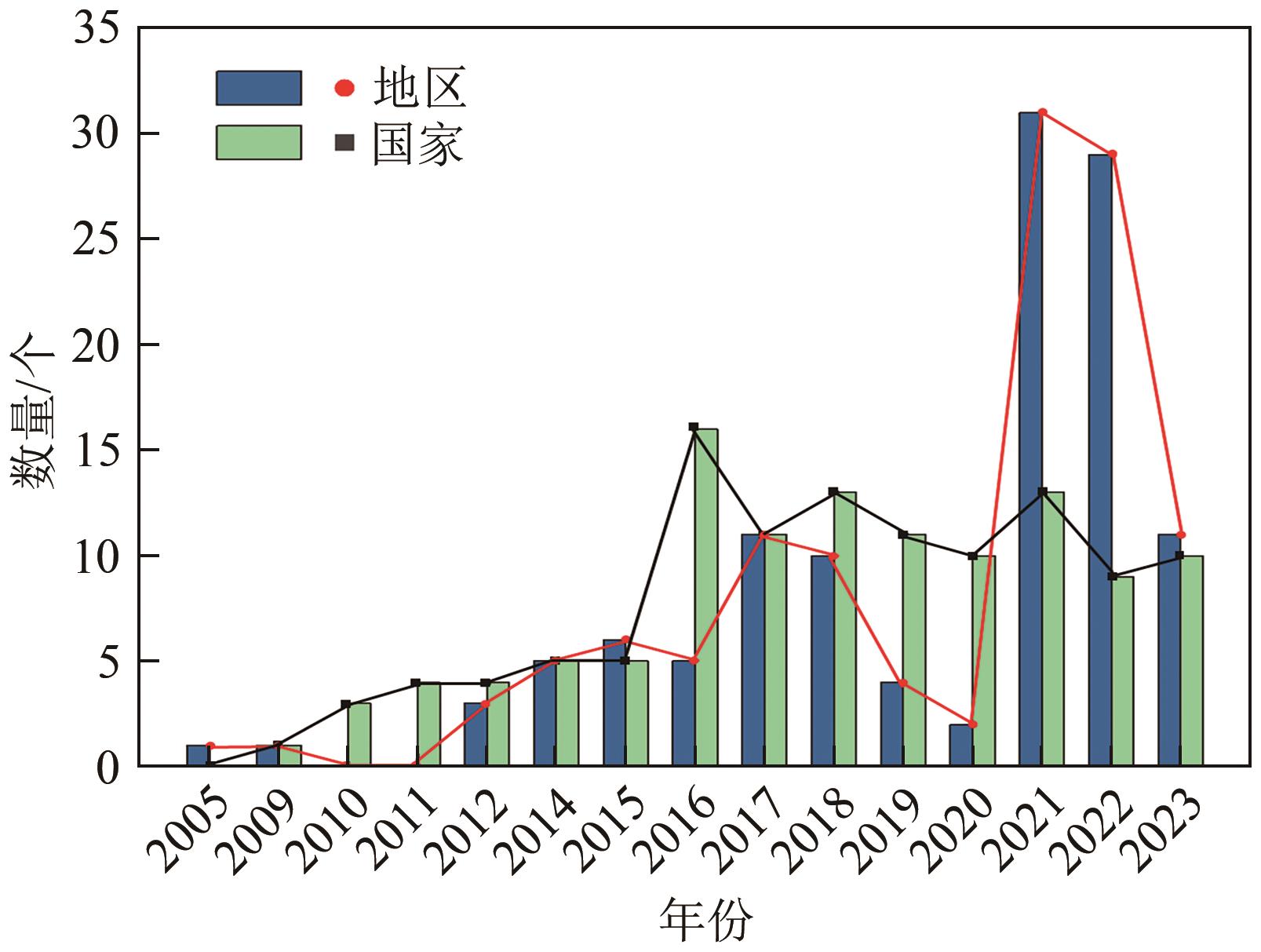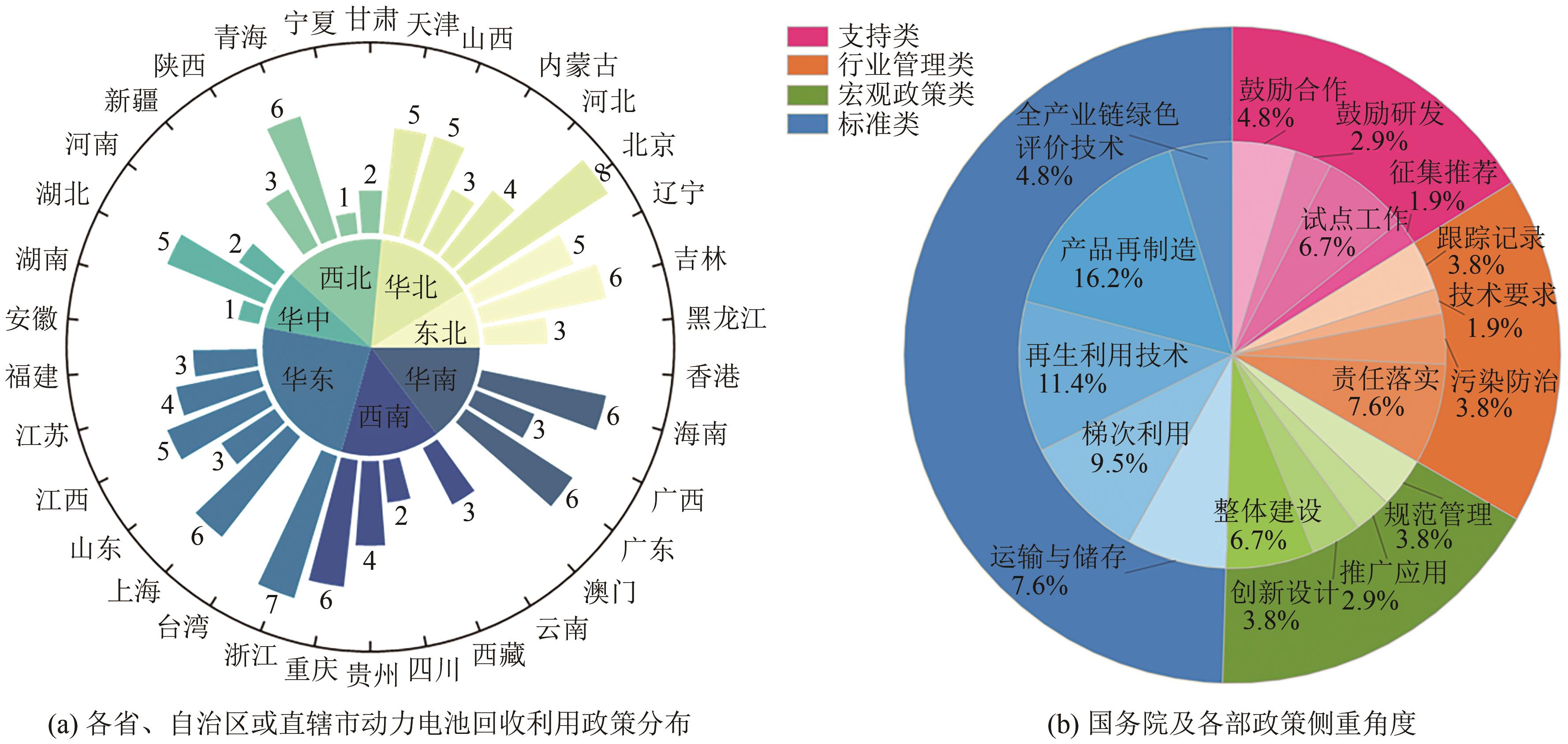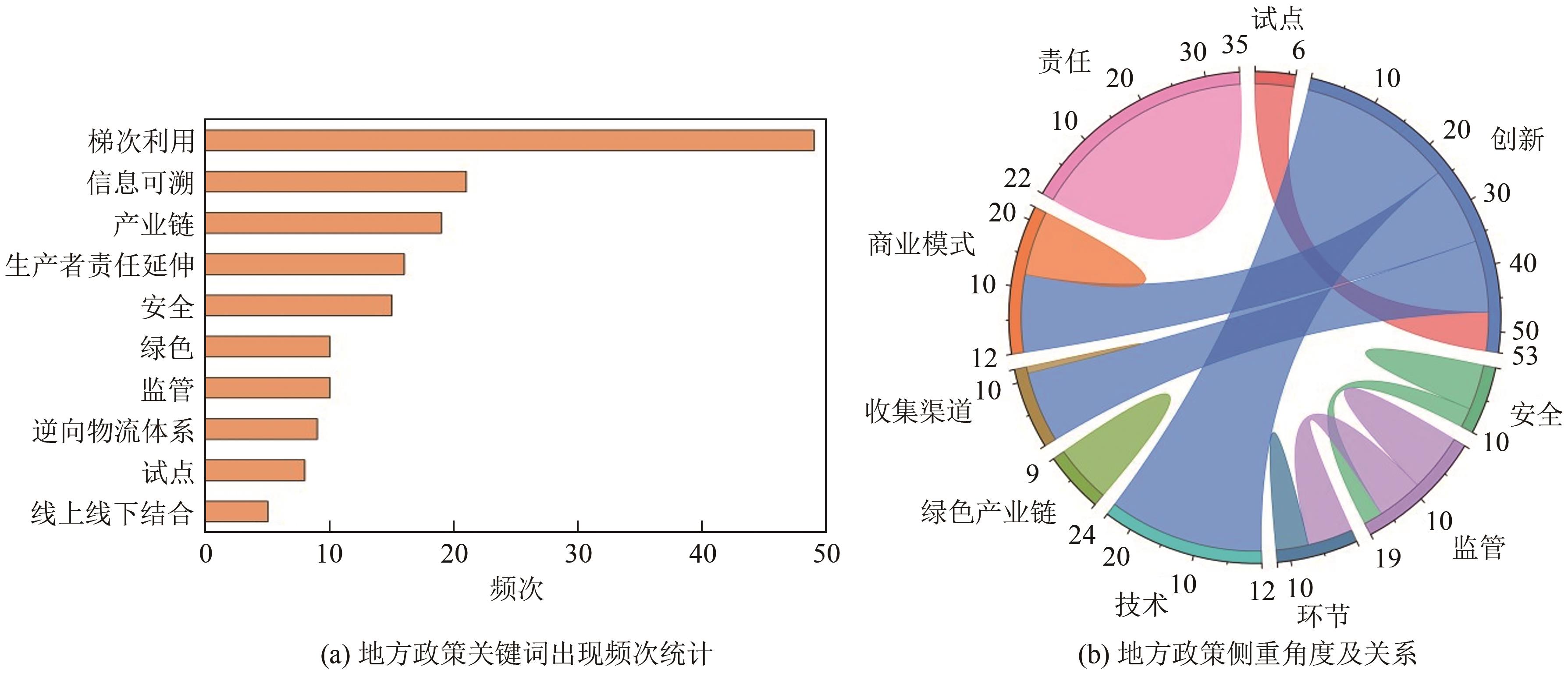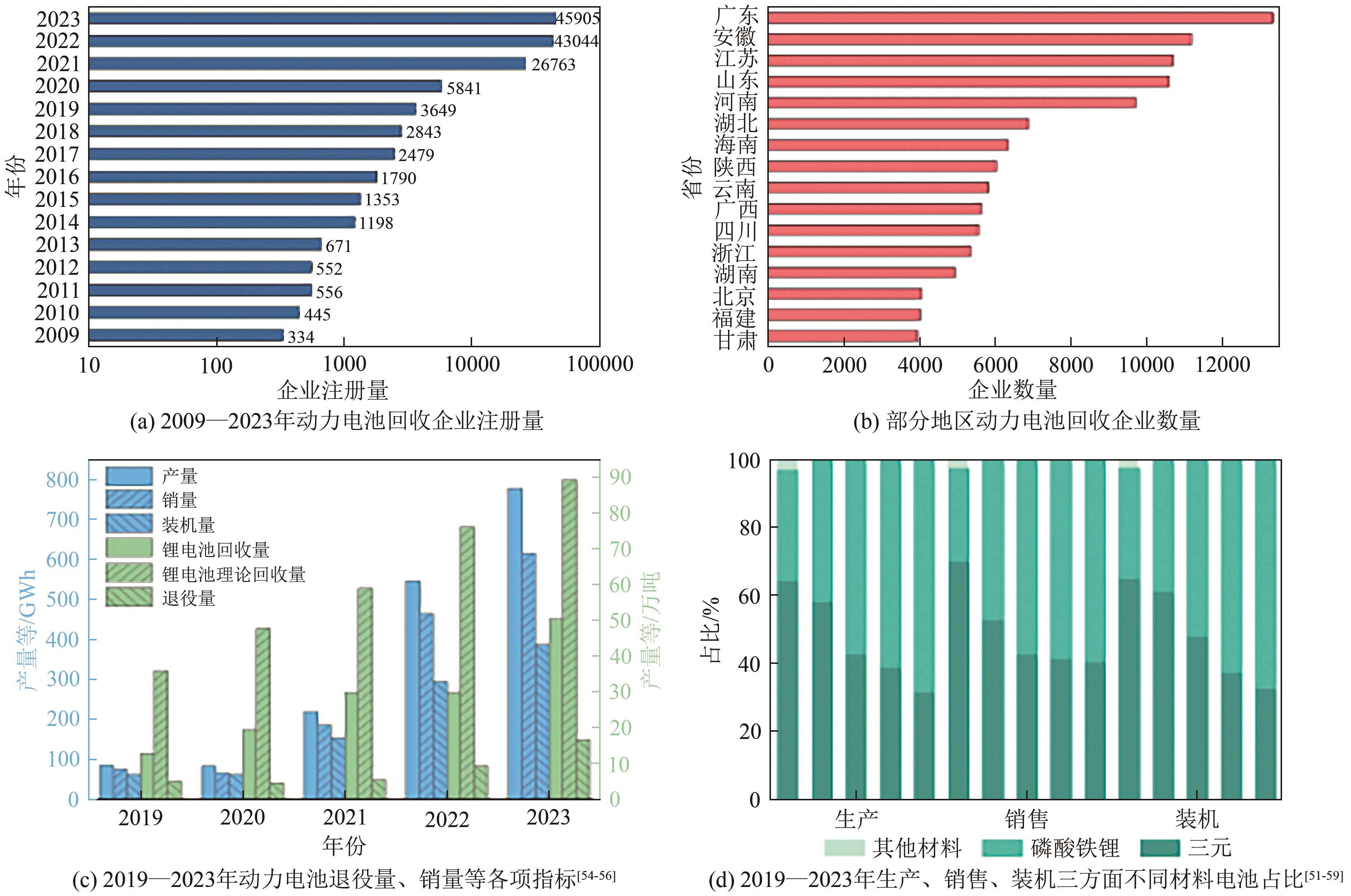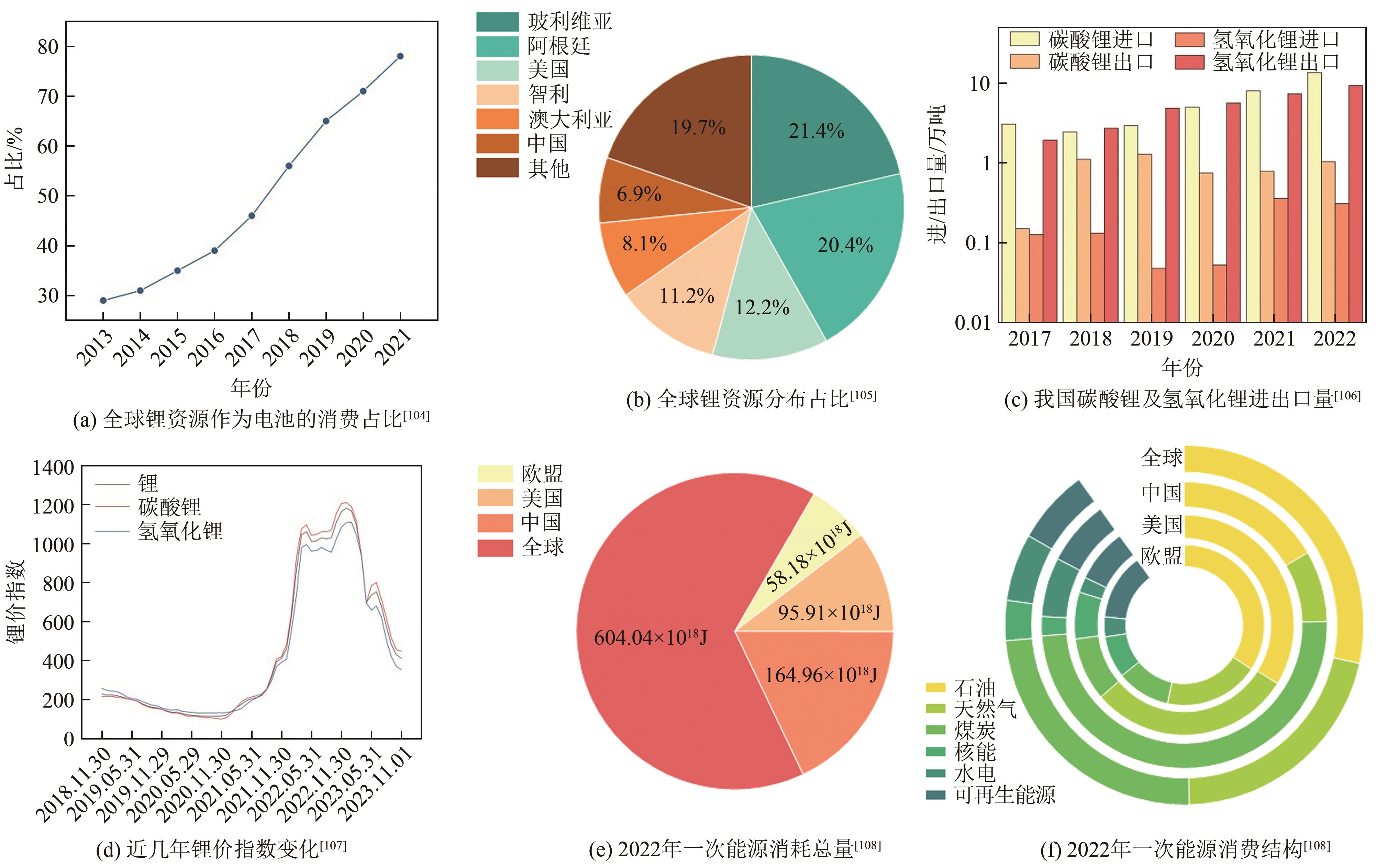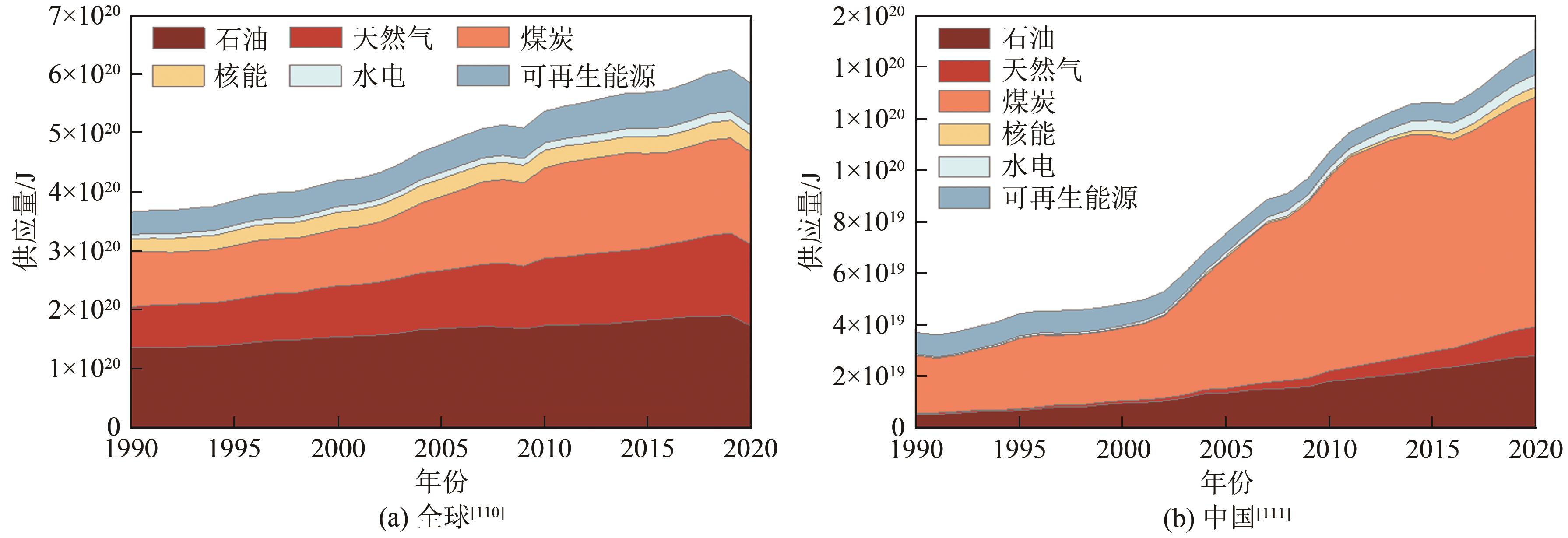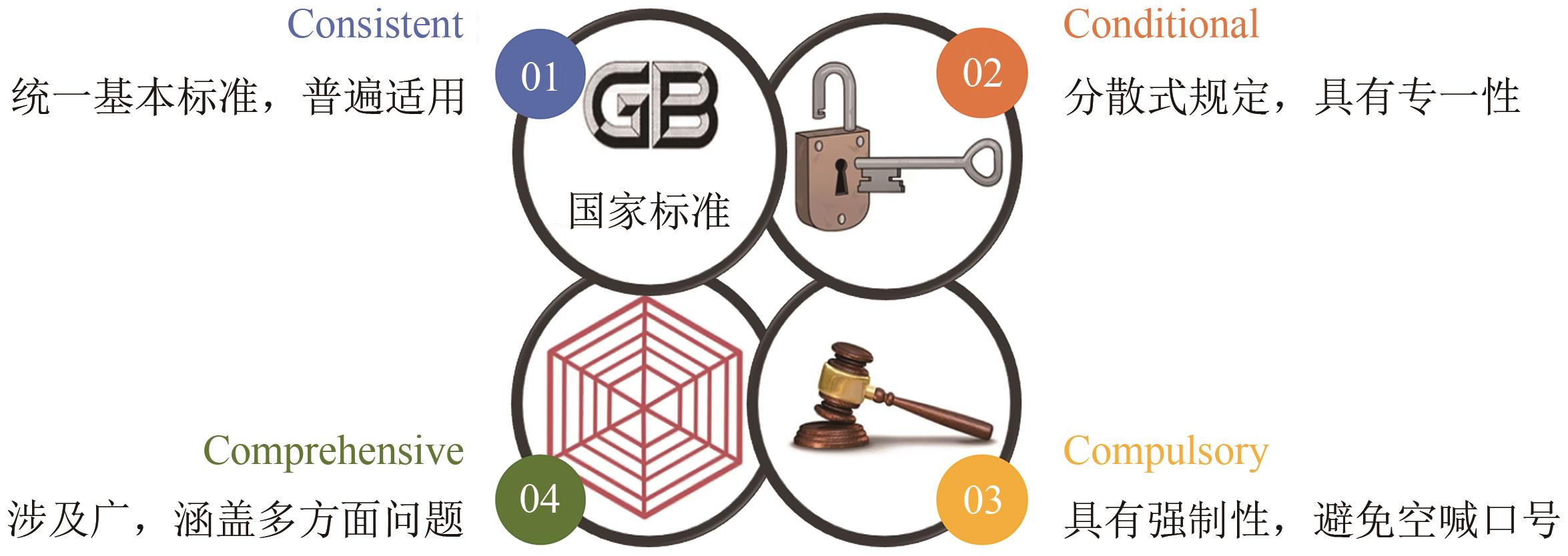| 1 |
郭明波. EPR制度下动力电池梯度利用的回收决策研究[D]. 重庆: 重庆交通大学, 2019.
|
|
GUO Mingbo. Research on recycling decision of power cell gradient utilization under EPR system[D].Chongqing: Chongqing Jiaotong University, 2019.
|
| 2 |
陶先刚. 低碳经济背景下新能源汽车发展对策研究[J]. 汽车测试报告, 2023(11): 70-72.
|
|
TAO Xiangang. Research on development countermeasures of new energy vehicles under the background of low-carbon economy[J]. Car Test Report, 2023(11): 70-72.
|
| 3 |
CUI Xilong. Introduction to the development trend of new energy vehicle industry[J]. Studies in Social Science Research, 2023, 4(2): 101.
|
| 4 |
张维佳. 我国新能源汽车产销连续9年位居全球第一[N]. 中国电子报, 2024-01-16(1).
|
| 5 |
CHEN Haopeng, ZHANG Tianshi, GAO Qing, et al. Assessment and management of health status in full life cycle of echelon utilization for retired power lithium batteries[J]. Journal of Cleaner Production, 2022, 379: 134583.
|
| 6 |
倪祥祥. 新能源汽车电池对环境污染以及危害的探究[J]. 时代汽车, 2023(14): 106-108.
|
|
NI Xiangxiang. Exploration of environmental pollution and harm of new energy vehicle batteries[J]. Auto Time, 2023(14): 106-108.
|
| 7 |
翁雅青, 龙光武, 李娅, 等. 退役动力电池综合回收研究进展及发展趋势[J]. 生物化工, 2022, 8(6): 139-146, 152.
|
|
WENG Yaqing, LONG Guangwu, LI Ya, et al. Research progress and development trend of comprehensive recycling of decommissioned power battery[J]. Biological Chemical Engineering, 2022, 8(6): 139-146, 152.
|
| 8 |
漆询, 文婕, 杨经纬. 新能源汽车动力电池正极材料回收技术进展[J]. 现代化工, 2023, 43(3): 51-56.
|
|
QI Xun, WEN Jie, YANG Jingwei. Progress in recovery technology of cathode materials of power batteries for new energy vehicles[J]. Modern Chemical Industry, 2023, 43(3): 51-56.
|
| 9 |
黄达. 我国新能源汽车动力电池回收现状及对策[J]. 综合运输, 2022, 44(12): 20-22.
|
|
HUANG Da. Current situation and countermeasures of recycling of power batteries for new energy vehicles in China[J]. China Transportation Review, 2022, 44(12): 20-22.
|
| 10 |
CHEN Shuyuan, CHEN Mengjun, SHU Jiancheng, et al. Comparative analysis of recycling modes of power batteries based on extended producer-responsibility principle[J]. Circular Economy, 2022, 1(2): 100013.
|
| 11 |
黄检炆, 曾桂生, 刘春力, 等. 退役锂离子动力电池梯次利用政策、挑战及研究进展[J]. 南昌航空大学学报(自然科学版), 2023, 37(3): 1-11.
|
|
HUANG Jianwen, ZENG Guisheng, LIU Chunli, et al. Policy, challenges and research progress of echelon utilization of retired lithium-ion power batteries[J]. Journal of Nanchang Hangkong University (Natural Sciences), 2023, 37(3): 1-11.
|
| 12 |
郭苑, 祁春玉. 车用动力电池回收利用政策及标准分析[J]. 汽车实用技术, 2021, 46(15): 177-180, 194.
|
|
GUO Yuan, QI Chunyu. Analysis of policies and standards for recycling and utilization of vehicle power batteries[J]. Automobile Applied Technology, 2021, 46(15): 177-180, 194.
|
| 13 |
CHEN Jiumei, ZHANG Wen, GONG Bengang, et al. Optimal policy for the recycling of electric vehicle retired power batteries[J]. Technological Forecasting and Social Change, 2022, 183: 121930.
|
| 14 |
张哲鸣, 吴正斌. 废旧动力电池回收政策及资源化研究[J]. 广州化工, 2018, 46(3): 132-135.
|
|
ZHANG Zheming, WU Zhengbin. Recycling policy and resources research of waste power batteries[J]. Guangzhou Chemical Industry, 2018, 46(3): 132-135.
|
| 15 |
刘娉. 国内新能源汽车动力电池回收法律政策对柳州市的启示[J]. 广西政法管理干部学院学报, 2020, 35(2): 87-92.
|
|
LIU Ping. The inspiration of domestic laws and policies of new energy vehicle power battery recovery to Liuzhou city[J]. Journal of Guangxi Administrative Cadre Institute of Politics and Law, 2020, 35(2): 87-92.
|
| 16 |
李建林, 王哲, 许德智, 等. 退役动力电池梯次利用相关政策对比分析[J]. 现代电力, 2021, 38(3): 316-324.
|
|
LI Jianlin, WANG Zhe, XU Dezhi, et al. A comparative analysis of relevant policies is made on retired power batteries[J]. Modern Electric Power, 2021, 38(3): 316-324.
|
| 17 |
梁秋阳, 岳亮亮, 张鹏, 等. 电动汽车动力电池回收概述[J]. 汽车电器, 2023(6): 8-11.
|
|
LIANG Qiuyang, YUE Liangliang, ZHANG Peng, et al. Overview of electric vehicle power battery recycling[J]. Auto Electric Parts, 2023(6): 8-11.
|
| 18 |
LIU Fang, TANG Juan, RUSTAM Adeela, et al. Evaluation of the central and local power batteries recycling policies in China: A PMC-Index model approach[J]. Journal of Cleaner Production, 2023, 427: 139073.
|
| 19 |
杨志军. 中央聚合—地方封闭政策体制及其更新: 国家治理现代化的政治资源再造[J]. 学术月刊, 2022, 54(1): 98-111.
|
|
YANG Zhijun. Central cohesive-local closed policy system and its renewal: The political resource reconstruction of national governance modernization[J]. Academic Monthly, 2022, 54(1): 98-111.
|
| 20 |
何杨华, 王文杰, 郝皓, 等. 退役动力电池回收模式及转运包装探讨[J]. 时代汽车, 2023(22): 132-134.
|
|
HE Yanghua, WANG Wenjie, HAO Hao, et al. Discussion on recycling mode and transshipment packaging of retired power batteries[J]. Auto Time, 2023(22): 132-134.
|
| 21 |
董希青, 李成杰, 李瑞杰, 等. 废旧锂离子动力电池回收:从基础研究到产业化[J]. 当代化工研究, 2023(19): 22-25.
|
|
DONG Xiqing, LI Chengjie, LI Ruijie, et al. Spent lithium-ion power battery recycling: From basic research to industrialization[J]. Modern Chemical Research, 2023(19): 22-25.
|
| 22 |
ZONG Yuhang, YAO Peifan, ZHANG Xihua, et al. Material flow analysis on the critical resources from spent power lithium-ion batteries under the framework of China's recycling policies[J]. Waste Management, 2023, 171: 463-472.
|
| 23 |
赵昕劼. 欧盟《电池法》对我国动力电池行业的立法启示[J]. 能源, 2023(8): 60-61.
|
|
ZHAO Xinjie. Legislative enlightenment of EU's battery law on China's power battery industry[J]. Energy, 2023(8): 60-61.
|
| 24 |
ZHAO Congyu, WANG Kun, DONG Kangyin. How does innovative city policy break carbon lock-in? A spatial difference-in-differences analysis for China[J]. Cities, 2023, 136: 104249.
|
| 25 |
GAO Yanhong, LIU Youdi, TAN Zhixiong, et al. Analysis of cooperation equilibrium of participants in power battery recycling chains considering information barrier[J]. Chinese Journal of Population, Resources and Environment, 2022, 20(2): 159-167.
|
| 26 |
陈轶嵩, 赵俊玮, 乔洁, 等. 我国电动汽车动力电池回收利用问题剖析及对策建议[J]. 汽车工程学报, 2018, 8(2): 97-103.
|
|
CHEN Yisong, ZHAO Junwei, QIAO Jie, et al. Analysis and countermeasures of recycling electric automotive power battery in China[J]. Chinese Journal of Automotive Engineering, 2018, 8(2): 97-103.
|
| 27 |
郑富艳. 我国动力电池回收利用产业绿色发展问题研究[D]. 郑州: 中原工学院, 2022.
|
|
ZHENG Fuyan. Research on green development of power battery recycling industry in China[D].Zhengzhou: Zhongyuan University of Technology, 2022.
|
| 28 |
邓舰木. 成都汽车动力电池回收利用政策执行问题及对策研究[D]. 成都: 电子科技大学, 2022.
|
|
DENG Jianmu. Implementation of Chengdu automobile power battery recycling policy[D].Chengdu: University of Electronic Science and Technology of China, 2022.
|
| 29 |
袁潮清, 朱玉欣. 基于动态热点的中国光伏产业政策演化研究[J]. 科技管理研究, 2020, 40(14): 43-53.
|
|
YUAN Chaoqing, ZHU Yuxin. Research on China's photovoltaic industry policy evolution based on dynamic hotspots[J]. Science and Technology Management Research, 2020, 40(14): 43-53.
|
| 30 |
于丹. 新能源汽车电池产业化尚需跨越两道坎[N]. 中国高新技术产业导报, 2009-04-13(D04).
|
| 31 |
山水. 中国动力电池产业现状堪忧[N]. 中国贸易报, 2010-08-03(2).
|
| 32 |
黎宇科, 周玮, 黄永和. 建立我国新能源汽车动力电池回收利用体系的设想[J]. 资源再生, 2012(1): 28-30.
|
|
LI Yuke, ZHOU Wei, HUANG Yonghe. The idea of establishment new energy automotive battery recycling system[J]. Resource Recycling, 2012(1): 28-30.
|
| 33 |
丁辉. 美国动力电池回收管理经验及启示[J]. 环境保护, 2016, 44(22): 69-72.
|
|
DING Hui. The recycling management reference and inspiration of US power battery[J]. Environmental Protection, 2016, 44(22): 69-72.
|
| 34 |
陆山, 樊锐, 陈新焕, 等. 废旧动力锂电池回收利用法规的现状及对策[J]. 检验检疫学刊, 2015, 25(1): 67-71.
|
|
LU Shan, FAN Rui, CHEN Xinhuan, et al. The status quo of spent power lithium battery recycling regulations and the countermeasures[J]. Journal of Inspection and Quarantine, 2015, 25(1): 67-71.
|
| 35 |
黎宇科, 高洋. 德国动力电池回收利用经验及启示[J]. 资源再生, 2013(10): 48-50.
|
|
LI Yuke, GAO Yang. Experiences and inspiration of traction battery recycling in Germany[J]. Resource Recycling, 2013(10): 48-50.
|
| 36 |
郝硕硕, 董庆银, 李金惠. 基于成本核算的废旧动力电池回收模式分析与趋势研究[J]. 中国环境科学, 2021, 41(10): 4745-4755.
|
|
HAO Shuoshuo, DONG Qingyin, LI Jinhui. Analysis and tendency on the recycling mode of used EV batteries based on cost accounting[J]. China Environmental Science, 2021, 41(10): 4745-4755.
|
| 37 |
杨健. 我国纯电动汽车废旧动力电池回收补贴政策研究[D]. 北京: 北京交通大学, 2022.
|
|
YANG Jian. The research about recycling subsidy policy of the spent EVs batteries in China[D]. Beijing: Beijing Jiaotong University, 2022.
|
| 38 |
LIANG Yanhua, LU Hongjuan. Dynamic evaluation and regional differences analysis of the NEV industry development in China[J]. Sustainability, 2022, 14(21): 13864.
|
| 39 |
李晓敏, 刘毅然, 杨娇娇. 中国新能源汽车推广政策效果的地域差异研究[J]. 中国人口·资源与环境, 2020, 30(8): 51-61.
|
|
LI Xiaomin, LIU Yiran, YANG Jiaojiao. On the regional differences of new energy vehicle promotion policy in China[J]. China Population, Resources and Environment, 2020, 30(8): 51-61.
|
| 40 |
李敦友. 全力打造西部新能源汽车产业高地——重庆市经信委与电力公司签订电动汽车充电设施建设协议[N]. 中国电力报, 2010-03-04(2).
|
| 41 |
闫红瑛. 基于区域产业链差异化的西部经济研究新视角——评《西部地区产业联动发展与政策优化研究》[J]. 经济问题探索, 2020(9): 2, 191.
|
|
YAN Hongying. A new perspective of western economic research based on the differentiation of regional industrial chains—Comment on “study on industrial linkage development and policy optimization in the western region” [J]. Inquiry into Economic Issues, 2020(9): 2, 191.
|
| 42 |
孙晨曦. 高寒地区新能源汽车锂电池低温预热及充电性能研究[D]. 兰州: 兰州理工大学, 2019.
|
|
SUN Chenxi. Study on low temperature preheating and charging performanceof lithium battery of new energy automobile in high coldRegion[D]. Lanzhou: Lanzhou University of Technology, 2019.
|
| 43 |
陈吉清, 翁楚滨, 兰凤崇, 等. 政策影响下的动力电池产业发展现状与趋势[J]. 科技管理研究, 2019, 39(9): 148-157.
|
|
CHEN Jiqing, WENG Chubin, LAN Fengchong, et al. Development status and trend of power battery industry under the influence of policy[J]. Science and Technology Management Research, 2019, 39(9): 148-157.
|
| 44 |
FAN Ersha, LI Li, WANG Zhenpo, et al. Sustainable recycling technology for Li-ion batteries and beyond: Challenges and future prospects[J]. Chemical Reviews, 2020, 120(14): 7020-7063.
|
| 45 |
王彩娟, 朱相欢. 车用动力电池回收利用国家标准解读[J]. 电池工业, 2020, 24(4): 211-215.
|
|
WANG Caijuan, ZHU Xianghuan. Interpretation of GB standard for recovery and utilization of automotive power battery[J]. Chinese Battery Industry, 2020, 24(4): 211-215.
|
| 46 |
马冬雪. 我国新能源汽车动力电池回收利用的法律规制[D]. 北京: 华北电力大学, 2022.
|
|
MA Dongxue. Legal regulation of power battery recycling of new energy vehicles in China[D].Beijing: North China Electric Power University, 2022.
|
| 47 |
LIU Zongwei, LIU Xinglong, HAO Han, et al. Research on the critical issues for power battery reusing of new energy vehicles in China[J]. Energies, 2020, 13(8): 1932.
|
| 48 |
HE Sichao, HU Song, WU Shuanghe, et al. A prediction model for recycling amount of recycled metal from waste power battery[J]. Journal of Physics: Conference Series, 2023, 2463(1): 012056.
|
| 49 |
鲍仁. 上半年全国锂电池产量同比增长超过 43%[N]. 期货日报, 2023-08-03(1).
|
| 50 |
王雅婧. 中国锂电池动力十足[N]. 中国纪检监察报, 2023-08-21(5).
|
| 51 |
RICHA Kirti, BABBITT Callie W, GAUSTAD Gabrielle, et al. A future perspective on lithium-ion battery waste flows from electric vehicles[J]. Resources, Conservation and Recycling, 2014, 83: 63-76.
|
| 52 |
龙宇娟, 庄越. 试论构建新能源汽车废旧锂电池回收利用体系[J/OL]. 工业安全与环保, 2023: 1-5. (2023-06-04). .
|
|
LONG Yujuan, ZHUANG Yue. Trial construction of new energy vehicle waste lithium battery recycling system[J/OL]. Industrial Safety and Environmental Protection, 2023: 1-5. (2023-06-04). .
|
| 53 |
资产信息网. 2022年动力电池回收行业研究报告[EB/OL].(2022-11-08) [2023-11-15]. .
|
| 54 |
上海有色网. SMM数据:中国废旧锂电回收量[DB]. .
|
|
Shanghai Metals Market. SMM data: China's waste lithium battery recycling volume[DB]. .
|
| 55 |
中汽数据. 2023年12月动力电池退役数据月报[EB/OL]. (2024-01-31) [2024-03-31]. .
|
|
Automotive Data of China. December 2023 power battery retirement data monthly report[EB/OL]. (2024-01-31) [2024-03-31]. .
|
| 56 |
头豹. 2023年中国动力电池回收行业概览[EB/OL]. (2023-09-07) [2024-03-31]. .
|
|
LeadLeo. China power battery recycling industry overview, 2023[EB/OL]. (2023-09-07) [2024-03-31]. .
|
| 57 |
中国汽车动力电池产业创新联盟. 2019年12月动力电池月度数据[EB/OL]. (2020-01-13) [2023-11-15]. .
|
|
China Automotive Battery Innovation Alliance. Power battery monthly data, December 2019[EB/OL]. (2020-01-13) [2023-11-15]. .
|
| 58 |
中国汽车动力电池产业创新联盟. 2021年12月动力电池月度数据[EB/OL]. (2022-01-13) [2023-11-15]. .
|
|
China Automotive Battery Innovation Alliance. Power battery monthly data, December 2021[EB/OL]. (2022-01-13) [2023-11-15]. .
|
| 59 |
中国汽车动力电池产业创新联盟. 2022年12月动力电池月度数据[EB/OL]. (2023-01-12) [2023-11-15]. .
|
|
China Automotive Battery Innovation Alliance. Power battery monthly data, December 2022[EB/OL]. (2023-01-12) [2023-11-15]. .
|
| 61 |
姚燕, 蒋琼. 汽车报废动力电池回收利用模式分析[J]. 汽车零部件, 2019(12): 91-94.
|
|
YAO Yan, JIANG Qiong. Recovery mode analysis of vehicle spent power battery[J]. Automobile Parts, 2019(12): 91-94.
|
| 62 |
胡晓, 李屹然. 锂离子电池回收利用规范的法治化进路[J]. 阅江学刊, 2023, 15(6): 67-77, 170.
|
|
HU Xiao, LI Yiran. Standardizing lithium-ion battery recycling in China: A legal approach[J]. Yuejiang Academic Journal, 2023, 15(6): 67-77, 170.
|
| 63 |
杨俊峰, 余跃, 王曦. 新能源汽车动力电池回收利用进展、挑战和建议[J]. 绿色矿冶, 2023, 39(2): 11-13, 18.
|
|
YANG Junfeng, YU Yue, WANG Xi. Progress, challenges and suggestions of power battery recycling for new energy vehicles[J]. Sustainable Mining and Metallurgy, 2023, 39(2): 11-13, 18.
|
| 64 |
陈益庆, 查文珂, 张希, 等. 新能源汽车动力电池回收利用的现状及建议[J]. 电池, 2024(1): 102-105.
|
|
CHEN Yiqing, ZHA Wenke, ZHANG Xi, et al. Status quo and suggestions of recycling of power battery for new energy vehicle[J]. Battery, 2024(1): 102-105.
|
| 65 |
曾思慧. 基于循环经济视角的新能源汽车动力电池回收利用分析[J]. 中国资源综合利用, 2022, 40(12): 94-96.
|
|
ZENG Sihui. Analysis of power battery recycling of new energy vehicles from the perspective of circular economy[J]. China Resources Comprehensive Utilization, 2022, 40(12): 94-96.
|
| 66 |
陈小长. 新能源汽车动力电池回收模式探究[J]. 时代汽车, 2023(15): 74-76.
|
|
CHEN Xiaochang. Exploration of recycling mode of new energy vehicle power battery[J]. Auto Time, 2023(15): 74-76.
|
| 67 |
XIAO Jinhua, JIANG Chengran, WANG Bo. A review on dynamic recycling of electric vehicle battery: Disassembly and echelon utilization[J]. Batteries, 2023, 9(1): 57.
|
| 68 |
刘若桐, 李建林, 吕喆, 等. 退役动力电池应用潜力分析[J]. 电气技术, 2021, 22(8): 1-9.
|
|
LIU Ruotong, LI Jianlin, Zhe LYU, et al. Application potential analysis of decommissioned power batteries[J]. Electrical Engineering, 2021, 22(8): 1-9.
|
| 69 |
李城城. 供应链视角下动力电池回收的政策影响研究[D]. 北京: 华北电力大学, 2022.
|
|
LI Chengcheng. Research on the policy impact of power battery recycling from the perspective of supply chain[D].Beijing: North China Electric Power University, 2022.
|
| 70 |
SU Yuhao. Comparative analysis of lithium iron phosphate battery and ternary lithium battery[J]. Journal of Physics: Conference Series, 2022, 2152(1): 012056.
|
| 71 |
张浩, 余圆圆, 张星惠. 补贴退坡下新能源汽车产业链融资效率研究[J]. 会计之友, 2023(21): 89-95.
|
|
ZHANG Hao, YU Yuanyuan, ZHANG Xinghui. Research on financing efficiency of new energy automobile industry chain under subsidy decline[J]. Friends of Accounting, 2023(21): 89-95.
|
| 72 |
中国物资再生协会. 2030年全球动力电池回收市场将超过1万亿瓦时[J]. 中国资源综合利用, 2023, 41(2): 92.
|
|
Global power battery recycling market to exceed 1 trillion watt-hours by 2030[J]. China Resources Comprehensive Utilization, 2023, 41(2): 92.
|
| 73 |
张长煦, 倪子潇. 车用三元锂电池与磷酸铁锂电池对比分析[J]. 汽车实用技术, 2019(23): 28-29, 65.
|
|
ZHANG Changxu, NI Zixiao. Comparative analysis of ternary lithium battery and LiFePO4 battery[J]. Automobile Applied Technology, 2019(23): 28-29, 65.
|
| 74 |
LIU Yongtao, ZHANG Chunmei, HAO Zhuo, et al. Study on the life cycle assessment of automotive power batteries considering multi-cycle utilization[J]. Energies, 2023, 16(19): 6859.
|
| 75 |
赖志颖, 赖文斌, 林楚园, 等. 退役动力电池回收利用的现状及碳核算研究进展[J/OL]. 过程工程学报, .
|
|
LAI Zhiying, LAI Wenbin, LIN Chuyuan, et al. A review on current status and carbon accounting of recycling and reusing of spent power batteries[J/OL]. The Chinese Journal of Process Engineering, .
|
| 76 |
梁展星, 陈露, 王文祥, 等. 废旧动力电池回收利用技术与政策分析[J]. 时代汽车, 2022(2): 121-122, 126.
|
|
LIANG Zhanxing, CHEN Lu, WANG Wenxiang, et al. Analysis of technology and policy for recycling and utilization of waste power batteries[J]. Auto Time, 2022(2): 121-122, 126.
|
| 77 |
赵光金, 李博文, 胡玉霞, 等. 退役动力电池梯次利用技术及工程应用概述[J]. 储能科学与技术, 2023, 12(7): 2319-2332.
|
|
ZHAO Guangjin, LI Bowen, HU Yuxia, et al. Overview of the echelon utilization technology and engineering application of retired power batteries[J]. Energy Storage Science and Technology, 2023, 12(7): 2319-2332.
|
| 78 |
NEUBAUER Jeremy S, PESARAN Ahmad, WILLIAMS Brett, et al. A techno-economic analysis of PEV battery second use: Repurposed-battery selling price and commercial and industrial end-user value[C]//SAE Technical Paper Series. 400 Commonwealth Drive, Warrendale, PA, United States: SAE International, 2012.
|
| 79 |
MARTINEZ-LASERNA E, GANDIAGA I, SARASKETA-ZABALA E, et al. Battery second life: Hype, hope or reality? A critical review of the state of the art[J]. Renewable and Sustainable Energy Reviews, 2018, 93: 701-718.
|
| 80 |
LAI Xin, HUANG Yunfeng, DENG Cong, et al. Sorting, regrouping, and echelon utilization of the large-scale retired lithium batteries: A critical review[J]. Renewable and Sustainable Energy Reviews, 2021, 146: 111162.
|
| 81 |
NIE Yongyou, WANG Yuhan, LI Lu, et al. Literature review on power battery echelon reuse and recycling from a circular economy perspective[J]. International Journal of Environmental Research and Public Health, 2023, 20(5): 4346.
|
| 82 |
KANG Zhuang, HUANG Zhixin, PENG Qingguo, et al. Recycling technologies, policies, prospects, and challenges for spent batteries[J]. iScience, 2023, 26(11): 108072.
|
| 83 |
王樱. 国内主要企业锂电池回收产能与技术工艺[EB/OL]. (2022-04-09) [2023-11-26]. .
|
|
WANG Ying. The main domestic enterprises lithium battery recycling capacity and technology process[EB/OL]. (2022-04-09) [2023-11-26]. .
|
| 84 |
TANG Yanyan, ZHANG Qi, LI Yaoming, et al. The social-economic-environmental impacts of recycling retired EV batteries under reward-penalty mechanism[J]. Applied Energy, 2019, 251: 113313.
|
| 85 |
MASSÉ Robert C, UCHAKER Evan, CAO Guozhong. Beyond Li-ion: Electrode materials for sodium- and magnesium-ion batteries[J]. Science China Materials, 2015, 58(9): 715-766.
|
| 86 |
YU Wenhao, GUO Yi, SHANG Zhen, et al. A review on comprehensive recycling of spent power lithium-ion battery in China[J]. eTransportation, 2022, 11: 100155.
|
| 87 |
CAI Xunchao, TIAN Li, CHEN Chiyu, et al. Phylogenetically divergent bacteria consortium from neutral activated sludge showed heightened potential on bioleaching spent lithium-ion batteries[J]. Ecotoxicology and Environmental Safety, 2021, 223: 112592.
|
| 88 |
WU Jiawei, ZHENG Mengting, LIU Tiefeng, et al. Direct recovery: A sustainable recycling technology for spent lithium-ion battery[J]. Energy Storage Materials, 2023, 54: 120-134.
|
| 89 |
张学梅, 吴奔奔, 明帮来, 等. 退役动力电池回收再生技术系列标准解读[J]. 电池, 2022, 52(5): 569-573.
|
|
ZHANG Xuemei, WU Benben, MING Banglai, et al. Interpretation of series standards of retired power battery recovery regenerated technique[J]. Battery Bimonthly, 2022, 52(5): 569-573.
|
| 90 |
左更, 李晓杰, 陈甲斌, 等. 我国金属矿产资源保供体系布局的思考[J]. 中国国土资源经济, 2023, 36(12): 4-9, 59.
|
|
ZUO Geng, LI Xiaojie, CHEN Jiabin, et al. Thinking on the layout of metal mineral resources guarantee system in China[J]. Natural Resource Economics of China, 2023, 36(12): 4-9, 59.
|
| 91 |
REN Zhijun, LI Huajie, YAN Wenyi, et al. Comprehensive evaluation on production and recycling of lithium-ion batteries: A critical review[J]. Renewable and Sustainable Energy Reviews, 2023, 185: 113585.
|
| 92 |
陈诗媛. 锂资源战略地位与经济价值分析[J]. 中国有色金属, 2023(19): 48-49.
|
|
CHEN Shiyuan. Analysis of strategic position and economic value of lithium resources[J]. China Nonferrous Metals, 2023(19): 48-49.
|
| 93 |
杨卉芃, 柳林, 丁国峰. 全球锂矿资源现状及发展趋势[J]. 矿产保护与利用, 2019, 39(5): 26-40.
|
|
YANG Huipeng, LIU Lin, DING Guofeng. Present situation and development trend of lithium resources in the world[J]. Conservation and Utilization of Mineral Resources, 2019, 39(5): 26-40.
|
| 94 |
张超, 路厚源, 费鹏飞, 等. 全球盐湖提锂领域研究发展态势[J/OL]. 盐湖研究. .
|
|
ZHANG Chao, LU Houyuan, FEI Pengfei, et al. Development trend of global research in the field of lithium extraction from salt lake brine[J/OL]. Journal of Salt Lake Research. .
|
| 95 |
韩佳欢, 郑绵平, 乜贞, 等. 我国深层地下卤水钾、锂资源及其开发前景[J]. 盐湖研究, 2024(2): 94-104.
|
|
HAN Jiahuan, ZHENG Mianping, NIE Zhen, et al. Lithium and potassium resources of oilfield brine and development prospects in China[J]. Journal of Salt Lake Research, 2024(2): 94-104.
|
| 96 |
张秀峰, 谭秀民, 刘维燥, 等. 矿石提锂技术现状与研究进展[J]. 矿产保护与利用, 2020, 40(5): 17-23.
|
|
ZHANG Xiufeng, TAN Xiumin, LIU Weizao, et al. Current status and research progress of lithium extraction technology from ore[J]. Conservation and Utilization of Mineral Resources, 2020, 40(5): 17-23.
|
| 97 |
马哲, 李建武. 中国锂资源供应体系研究: 现状、问题与建议[J]. 中国矿业, 2018, 27(10): 1-7.
|
|
MA Zhe, LI Jianwu. Analysis of China's lithium resources supply system: Status, issues and suggestions[J]. China Mining Magazine, 2018, 27(10): 1-7.
|
| 98 |
SONG Jiali, YAN Wenyi, CAO Hongbin, et al. Material flow analysis on critical raw materials of lithium-ion batteries in China[J]. Journal of Cleaner Production, 2019, 215: 570-581.
|
| 99 |
邹才能, 熊波, 李士祥, 等. 碳中和背景世界能源转型与中国式现代化的能源革命[J]. 石油科技论坛, 2024(1): 7-23.
|
|
ZOU Caineng, XIONG Bo, LI Shixiang, et al. World energy transformation and China's modern energy revolution under carbon neutrality background[J]. Petroleum Science and Technology Forum, 2024(1): 7-23.
|
| 100 |
侯梅芳. 碳中和目标下中国能源转型和能源安全的现状、挑战与对策[J]. 西南石油大学学报(自然科学版), 2023, 45(2): 1-10.
|
|
HOU Meifang. Current situation, challenges and countermeasures of China's energy transformation and energy security under the goal of carbon neutrality[J]. Journal of Southwest Petroleum University (Science & Technology Edition), 2023, 45(2): 1-10.
|
| 101 |
AL-GHAILI Abbas M, KASIM Hairoladenan, ARIS Hazleen, et al. Can electric vehicles be an alternative for traditional fossil-fuel cars with the help of renewable energy sources towards energy sustainability achievement?[J]. Energy Informatics, 2022, 5(4): 60.
|
| 102 |
张铁龙. 新能源风力发电技术研究[J]. 技术与市场, 2020, 27(11): 116, 118.
|
|
ZHANG Tielong. Research on new energy wind power generation technology[J]. Technology and Market, 2020, 27(11): 116, 118.
|
| 103 |
刘杰. 太阳能光伏发电系统及应用前景分析[J]. 新能源科技, 2020(9): 31-34.
|
|
LIU Jie. Solar photovoltaic power generation system and its application prospect analysis[J]. New Energy Technology, 2020(9): 31-34.
|
| 104 |
茹存一. 中国锂矿资源供需形势评价[D]. 北京: 中国地质大学(北京), 2021.
|
|
RU Cunyi. Research on risk evaluation and situation of China's lithium resources supply[D].Beijing: China University of Geosciences, 2021.
|
| 105 |
United States Geological Survey, National Minerals Information Center. Mineral commodity summaries 2023[EB/OL]. (2023-01-31) [2023-11-15]. .
|
| 106 |
中华人民共和国国海关总署. 海关统计数据在线查询平台[DB]. .
|
|
General Administration of Customs of the People's Republic of China. Customs statistics online search platform[DB]. .
|
| 107 |
Benchmark Mineral Intelligence. Lithium Prices Index[Z]. https://www.benchmarkminerals.com/price-assessments/lithium/?tab=chart.
|
| 108 |
毕马威, 能源研究院. 世界能源统计年鉴2023[EB/OL]. (2023-11-06) [2023-11-15]. .
|
|
KPMG, Energy Institute. Statistical Review of World Energy 2023[EB/OL]. (2023-11-06) [2023-11-15]. .
|
| 109 |
LI Hanshi, ZHU Ting, CHEN Xiangshun, et al. Improving China's global lithium resource development capacity[J]. Frontiers in Environmental Science, 2022, 10: 938534.
|
| 110 |
International Energy Agency. Total energy supply (TES) by source, World 1990-2022[Z]. https://www.iea.org/data-and-statistics/data-tools/energy-statistics-data-browser?country=WORLD&fuel=Energy%20 supply&indicator=TESbySource.
|
| 111 |
International Energy Agency. Total energy supply (TES) by source, People's Republic of China 1990—2022[Z]. https://www.iea.org/data-and-statistics/data-tools/energy-statistics-data-browser?country=CHINA&fuel=Energy%20supply&indicator=TESbySource.
|
 ), WANG Jiaqing1, WANG Zhongqiang1, WANG Zeng1, WANG Zhaolong2, CUI Han1, ZENG Xianju1, WANG Gaohan3, LYU Longyi1(
), WANG Jiaqing1, WANG Zhongqiang1, WANG Zeng1, WANG Zhaolong2, CUI Han1, ZENG Xianju1, WANG Gaohan3, LYU Longyi1( ), SUN Zhi4(
), SUN Zhi4( )
)
 ), 王嘉庆1, 王忠强1, 王增1, 王兆龙2, 崔晗1, 曾献举1, 王高捍3, 吕龙义1(
), 王嘉庆1, 王忠强1, 王增1, 王兆龙2, 崔晗1, 曾献举1, 王高捍3, 吕龙义1( ), 孙峙4(
), 孙峙4( )
)
